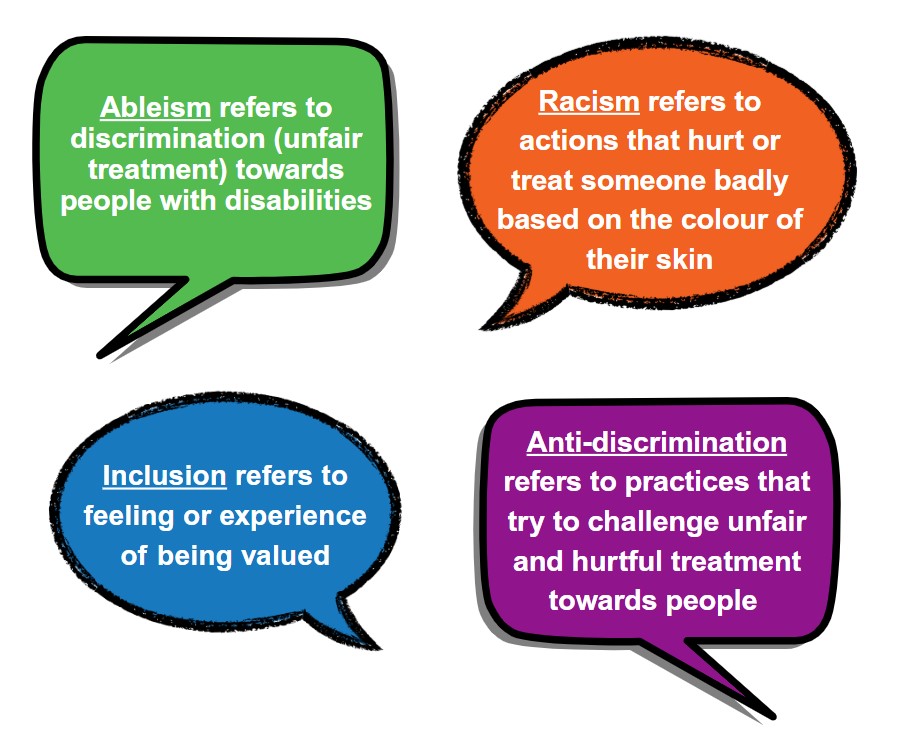What is ableism, racism, inclusion, and anti-discrimination?

Learn about discrimination, ableism, and inclusion through Holland Bloorview resources.
- Ableism refers to discrimination (unfair treatment) towards people with disabilities
- Racism refers to actions that hurt or treat someone badly based on the colour of their skin
- Inclusion refers to feeling or experience of being valued
- Anti-discrimination refers to practices that try to challenge unfair and hurtful treatment towards people
People with disabilities experience discrimination towards their disability (ableism), but they can also experience discrimination towards their race (racism), gender (gender-based discrimination), and other identities [1,2].
![Did you know? UNICEF reports that one billion people with disabilities worldwide experience discrimination [1]](/sites/default/files/inline-images/Screenshot%202025-06-09%20125611.jpg)
Often, children and youth face more ableism than older age groups [3]. Their experiences lead to negative mental health, loneliness, lack of access to essential services (e.g. healthcare), and fewer job opportunities [2, 4, 5].
We need to challenge discrimination so people can have better health, access to services, and opportunities. It is important for children and youth to have a happy life, that is free from discrimination so they can have more positive future outcomes [6].
References
- UNICEF. Addressing stigma and discrimination toward children and youth with disabilities through SBC Disability Toolkit. 2024. Available from: this link
- Lindsay S, Li Y, Joneja S, Hsu S. Experiences of racism and racial disparities in health care among children and youth with autism and their caregivers: A systematic review. Disability and Rehabilitation. 2025 Feb 27;47(5):1061-80.
- Harder JA, Keller VN, Chopik WJ. Demographic, experiential, and temporal variation in ableism. Journal of Social Issues. 2019 Sep;75(3):683-706.
- Lindsay S, Patel S, Ragunathan S, Fuentes K. Ableism among children and youth with acquired brain injury and their caregivers: A systematic review. Brain Injury. 2023 Jul 3;37(8):714-25.
- Lindsay S, Fuentes K, Tomas V, Hsu S. Ableism and workplace discrimination among youth and young adults with disabilities: A systematic review. Journal of Occupational Rehabilitation. 2023 Mar;33(1):20-36.
- UNICEF. Seen, Counted, Included: Using data to shed light on the well-being of children with disabilities. 2021. Available from: this link
What is ableism? - created by Holland Bloorview, this guide provides information about ableism and disability inclusion.
Source: Holland Bloorview Kids Rehabilitation Hospital. What is ableism? [Internet]. Toronto, Ontario: Holland Bloorview Kids Rehabilitation Hospital [cited 2025 Jan 24].
Kid2Kid advice - Advocacy - created by Holland Bloorview, this video offers advocacy advice for kids (run time: 2 minutes and 10 seconds).
Source: Kid2Kid advice - Advocacy [Internet]. Toronto, Ontario: Holland Bloorview Kids Rehabilitation Hospital; 2021 Aug 12 [cited 2025 Jan 24].
Please note that by clicking the above link(s), you will be redirected to an external website. We cannot guarantee the quality of the information nor are we endorsing these sites.
